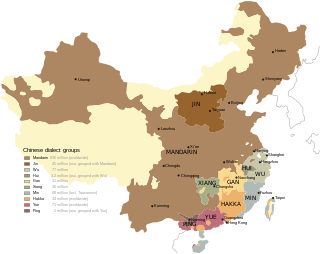Related Research Articles

Gansu is a landlocked province in Northwest China. Its capital and largest city is Lanzhou, in the southeast part of the province.

Lanzhou is the capital and largest city of Gansu province in northwestern China. Located on the banks of the Yellow River, it is a key regional transportation hub, connecting areas further west by rail to the eastern half of the country. Historically, it has been a major link on the Northern Silk Road and it stands to become a major hub on the New Eurasian Land Bridge. The city is also a center for heavy industry and petrochemical industry.

Hanzhong is a prefecture-level city in the southwest of Shaanxi province, China, bordering the provinces of Sichuan to the south and Gansu to the west.
Niu Xianke, formally Duke Zhenjian of Bin (豳貞簡公), was a general and official of the Chinese Tang dynasty. He served as a chancellor during the reign of Emperor Xuanzong of Tang. He took an unconventional path to the position of chancellor by starting as a low-level bureaucrat and gradually getting promoted, rather than going through the imperial examinations, and was known for being careful and obedient to fellow chancellor Li Linfu.

The Sinitic languages, often synonymous with the Chinese languages, are a group of East Asian analytic languages that constitute a major branch of the Sino-Tibetan language family. It is frequently proposed that there is a primary split between the Sinitic languages and the rest of the family. This view is rejected by a number of researchers but has found phylogenetic support among others. The Macro-Bai languages, whose classification is difficult, may be an offshoot of Old Chinese and thus Sinitic; otherwise Sinitic is defined only by the many varieties of Chinese unified by a shared historical background, and usage of the term "Sinitic" may reflect the linguistic view that Chinese constitutes a family of distinct languages, rather than variants of a single language.

Longnan is a prefecture-level city in the southeast of Gansu province in China. It borders Sichuan on its south and Shaanxi on its east. As of the 2020 Chinese census, the population of the prefecture-level city was 2,855,555.

Lanzhou Zhongchuan International Airport is an international airport serving Lanzhou, the capital of Northwest China’s Gansu province. It is located 71 kilometres (44 mi) northwest of downtown Lanzhou. It was opened in 1970 and serves as a major air hub for the province of Gansu and western China. There are eight gates served by aerobridges in the terminal. A new larger Terminal 2 is located to the South, adjacent to the existing terminal. The new terminal adds nine aerobridges.
Wang Dazhi was a Chinese educator.

Wudu District is a district and the political and cultural centre of Longnan, Gansu province, China. It borders the provinces of Shaanxi and Sichuan to the southeast. It has a population of 590,000, of which 110,000 live in the urban area.

Binzhou, formerly known as Bin County or Binxian, is a county-level city of Xianyang, Shaanxi, China, bordering Gansu province in two disparate sections to the north and west.

Waxiang is a divergent variety of Chinese, spoken by the Waxiang people, an unrecognized ethnic minority group in the northwestern part of Hunan province, China. Waxiang is a distinct language, and is very different from the surrounding Southwestern Mandarin, Xiang Chinese, and the Eastern Miao (Xong) languages.

Lanzhou New Area is a state-level new area established in 2012 and is under the direct control of the municipal government of Lanzhou, Gansu province. It is located in the valley around Lanzhou Zhongchuan Airport, 30 kilometres from the old city of Lanzhou. It is the first state-level new development area in northwestern China, and the fifth state-level new area in the country.
Caijia is an endangered Sino-Tibetan language spoken in an area centred on Bijie, in the west of the Chinese province of Guizhou. It was first documented by Chinese researchers in the 1980s. It has been described by different authors as a relative of Bai or an early split from Old Chinese. The autonym is. According to Lu (2022), Caijia speakers in Xingfa 兴发乡, Hezhang County refer to their language as.

The Longjia are an unofficially recognized ethnic group of western Guizhou province, China. They are officially classified as Bai by the Chinese government.

Lanzhou Metro or Lanzhou Rail Transit is a rapid transit system in Lanzhou, Gansu, China.
Li Shunxian was a Chinese poet celebrated for her beauty and poetic talent. She was a concubine of Wang Yan, the Chinese Emperor of Former Shu. She was famous for being a Chinese woman of Persian ancestry who was an accomplished poet in the Chinese language.

Shui Junyi, is a Chinese Han journalist.
Tu Shandong is a Chinese engineer specializing in machinery and power engineering. He is an academician of the Chinese Academy of Engineering (CAE) and formerly served as vice-president of East China University of Science and Technology. He is an honorary professor at the University of Nottingham, a member of the International Federation for the Promotion of Mechanism and Machine Science (IFToMM) and the Chinese Mechanical Engineering Society (CMES).
References
- ↑ 水中天. "教育家水梓的一生".[ permanent dead link ]
- 1 2 "走出洮州的甘肃水氏族人:水梓兄弟". 洮州风情线. Retrieved 2010-04-06.[ permanent dead link ]
- ↑ 马军 (2011-10-10). "历尽艰辛成立临时议会" (in Chinese (China)). 蘭州晚报. Archived from the original on 2016-03-05. Retrieved 2012-01-15.
- ↑ 牛宏 (1986-06-25). "记陇上名人牛载坤先生生平" (PDF).
- ↑ 王萌. "陇上名教育家——水梓". 中国兰州网. Archived from the original on 2012-07-17. Retrieved 2012-02-16.
- ↑ "兰州市第八中学". Archived from the original on 2012-05-11. Retrieved 2020-06-16.